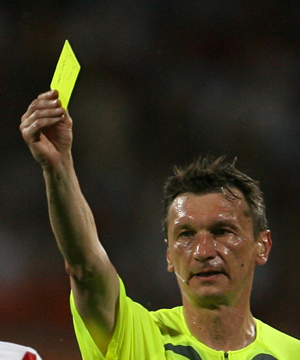Every soccer referee is
taught that one of his main jobs is to ensure player safety. When the players
show they can't control themselves, the referee must do it for them.
Unfortunately, Valentin Ivanov couldn't handle that essential chore Sunday,
when Portugal played the Netherlands in the second round of the World Cup.

Referee Valentin
Ivanov of Russia shows a yellow card during the second round World Cup
2006 soccer match between Portugal and the Netherlands in Nuremberg June
25, 2006. In a dramatic and explosive game marked by a flurry of yellow
cards and four reds, a record for a match at any World Cup finals,
Portugal clung on to Maniche Ribeiro's goal to win 1-0.
[Reuters] |
The result? A 1-0 win for Portugal,
but also 16 yellow cards and four reds, equaling the record for most cards
handed out in a World Cup game and setting a mark for expulsions in a single
tournament match.
At this rate, the 2006 World Cup would finish with 352 yellow cards _ 5.5 per
game _ and 28 reds.
That compares with 272 yellows and 17 reds handed out at the 2002 tournament
and 258 yellows and 22 reds given out at France 1998.
On Monday Spanish referee Luis Medina handed out six yellow cards and one red
_ sending off Italy's Marco Materazzi _ in Italy's 1-0 victory over Australia,
achieved thanks to a penalty given 12 seconds from the end of injury. 298 yellow
cards and 24 reds have now been handed out in Germany 2006 after Monday's two
matches.
FIFA president Sepp Blatter criticized the Russian referee's handling of
Sunday's game, saying it was inconsistent and that he deserved a yellow card
himself.
That's as clear a hint as possible from the FIFA boss that Ivanov, the son of
a famous former international striker for the Soviet Union, will soon be on his
way back to his full-time profession as a university teacher in Moscow and, like
England's Graham Poll, will probably not be needed any more in Germany.
It's not as if players didn't know they needed to be on their best behavior
in Germany. FIFA announced a clampdown on elbowing, diving, shirt-pulling and
delaying restarts before the tournament, and players were briefed at meetings
just before the start of the World Cup.
Most of the games in Germany have been played in good spirit, although United
States vs. Italy, Croatia vs. Australia and Sunday's match have been the
high-profile exceptions in which violence and red cards were on display.
The first 30 minutes of Sunday's match gave only one indication it was going
to be anything other than a tense clash between two excellent teams.
In the seventh minute, the Netherlands' Khalid Boulahrouz made what appeared
to be an attempt to kick Portugal's most talented player, Cristiano Ronaldo, out
of the game. He succeeded.
Ronaldo never recovered from the brutal challenge and limped off the field in
tears 25 minutes later, having been reduced to jogging pace.
Should Ivanov have shown Boulahrouz a red card? The challenge clearly fell
under the category of "serious foul play" and filled all the conditions referees
use to decide if a player should be sent off. And a red card at that point of
the match might have sent a crucial message to the players that violence was not
going to be permitted.